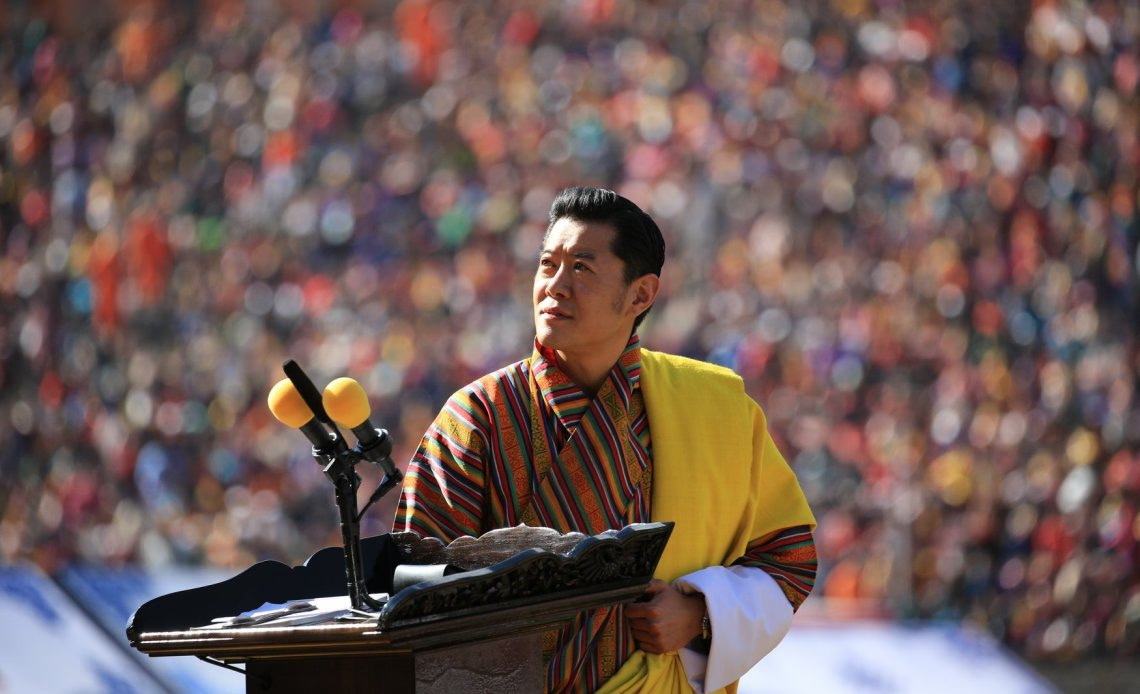
Bhutan, the land of the Dragon Kings, overwhelms and moves visitors easily — not with its traditional architecture or intriguing history, but with the nation’s generosity, simplicity, and love for its traditions. Like any family, one's children can only be as good as one's parents.
And for Bhutan, this little nation has been blessed with having a line of monarchs who were far-sighted, humble, and ruled the nation with the unconditional love any parent had for their child.
In this blog, we will explore the life of the 5 kings of Bhutan, highlighting the reformations they brought and their legacy.
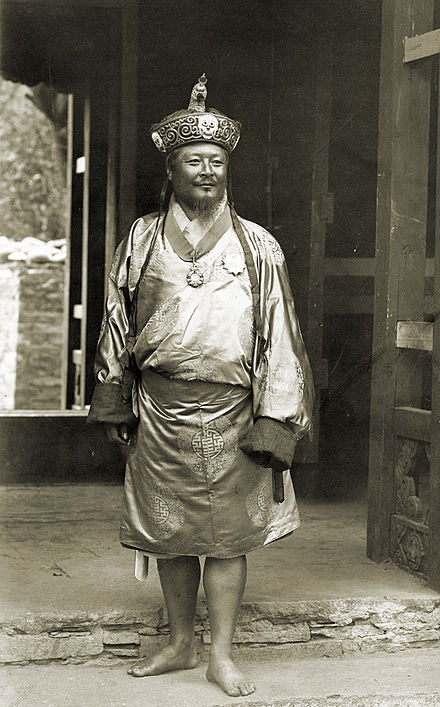
The First King of Bhutan – Sir Ugyen Wangchuck (Reign: 1907 to 1926)
Bhutan was unified into a single religious state by Shabdrung Ngawang Namgyel in 1616, who established a dual system of governance. This system was characterized by the Central Monastic Body, led by the Je Khenpo (Chief Abbot), and a political structure headed by a secular ruler, the Desi.
The transition to a monarchy began when Ugyen Wangchuck, a descendant of Jigme Namgyel succeeded as the Penlop (Governor). Unlike his predecessors, he had the vision to unify Bhutan under a singular leadership, ending the dual governance system and establishing the Wangchuck dynasty.
Ugyen Wangchuck rose to power during a time of political instability in Bhutan. His leadership and diplomatic skills enabled him to consolidate power, and in 1907, he was unanimously elected as the first Druk Gyalpo (Dragon King) of Bhutan, marking the establishment of the monarchy.
Achievements And Reforms
As the first king of Bhutan, Ugyen Wangchuck played a pivotal role in unifying Bhutan, which had been fragmented by internal conflicts. He modernized the country's administration, laying the groundwork for a centralized government.
Ugyen Wangchuck also established formal diplomatic relations with British India, strengthening Bhutan's position in the region. He introduced various reforms to improve the administration, judicial system, and infrastructure.
Legacy
Ugyen Wangchuck's reign marked the beginning of a stable and progressive era in Bhutan's history. His efforts in unification and modernization laid the foundation for the future development of the country.
He is remembered as a visionary leader who set the stage for Bhutan's journey toward modernization while preserving its cultural heritage. His legacy continues to influence Bhutan's political and social landscape.
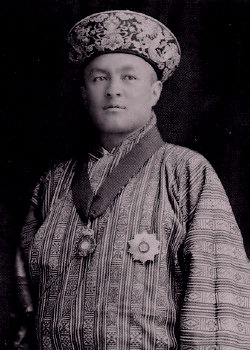
The Second King of Bhutan – Jigme Wangchuck (Reign: 1926 to 1952)
Jigme Wangchuck, the second kingof Bhutan, born in 1905, ascended the throne in 1926 upon the passing of his father. He was raised as the successor to the throne. He received a strict education in English and Hindi, and was schooled in Buddhist principles.
His coronation marked the continuation of the Wangchuck dynasty and the consolidation of power in Bhutan's central government.
Achievements And Reforms
During his reign, King Jigme Wangchuck focused on maintaining stability and continuity. He worked to strengthen Bhutan's central administration and legal system.
He also fostered closer ties with British India, which later transitioned into relations with the newly independent India. He continued the development of infrastructure and public services initiated by his father.
Legacy
King Jigme Wangchuck is remembered for his dedication to preserving Bhutan's sovereignty and cultural heritage. His reign was characterized by stability and gradual modernization, setting the stage for further progress under his successor.
His efforts helped maintain Bhutan's isolation, protecting it from external influences while ensuring internal unity and peace. He was succeeded by his eldest son, Jigme Dorji Wangchuck.
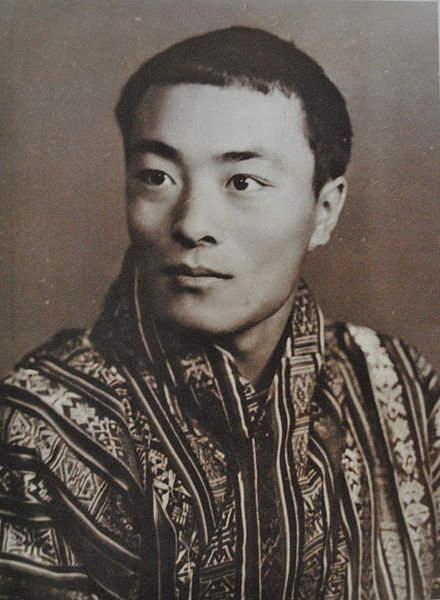
The Third King of Bhutan – Jigme Dorji Wangchuck (Reign: 1952 to 1972)
Jigme Dorji Wangchuck, born in 1929, ascended the throne at the age of 23. He is known as the Father of Modern Bhutan. Like his father, he was educated in English, Hindi and Buddhist principles. Additionally, he spent six months in England during his youth.
Achievements And Reforms
King Jigme Dorji Wangchuck ended Bhutan's isolation by establishing international relations to protect the country's sovereignty. He engaged foreign nations, inviting them to participate in Bhutan's development. In 1962, Bhutan joined the Colombo Plan, receiving technical assistance and educational scholarships.
The third king of Bhutan also initiated socio-economic reforms, including the end of feudalism in 1956, the redistribution of land, and the introduction of the first five-year economic development plan in 1961.
He established a modern judicial system, the country's first Council of Ministers, and the National Assembly (Tshogdu), which had the power to remove the King or his successors.
Legacy
King Jigme Dorji Wangchuck's reign marked the beginning of Bhutan's journey towards democracy and modernization. His policies opened Bhutan to the outside world, setting the country on a path of steady development and peace.
His far-sighted reforms continue to influence Bhutan's governance and socio-economic landscape, making him a pivotal figure in the nation's history.
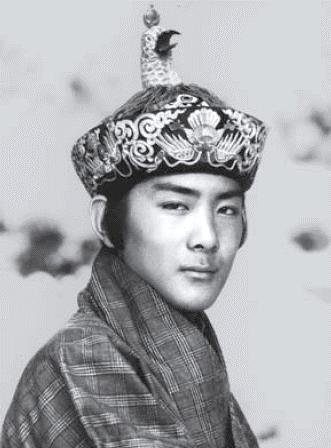
The Fourth King of Bhutan – Jigme Singye Wangchuck (Reign: 1972 to 2006)
Jigme Singye Wangchuck was born in 1955 and ascended the throne in 1972 at the age of 17, making him the youngest monarch in the world at the time. He received a modern education in India and the United Kingdom and gained valuable insights into Bhutan's people and landscape through extensive tours with his father.
Achievements And Reforms
King Jigme Singye Wangchuck is best known for introducing the concept of Gross National Happiness (GNH), focusing on holistic development rather than purely economic growth. He initiated significant socio-economic reforms, including the decentralization of power.
In 1998, he established the role of Prime Minister, marking a shift towards democratic governance. He also played a pivotal role in modernizing Bhutan, promoting international relations, and enhancing the nation's infrastructure.
Under the reign of the 4th king of Bhutan, the country joined various regional cooperative bodies and became more involved in the United Nations, strengthening its sovereign status.
One of his significant achievements was Bhutan's economic progress, particularly in industries such as agriculture and hydropower. He also prioritized education, sending students abroad, and expanding educational facilities within the country.
The establishment of Drukair, Bhutan's national airline, in 1981 and the subsequent opening to foreign tourists in 1974 under the 'High value, low volume' tourism policy were key milestones in his reign.
Additionally, he personally led a successful military operation in 2003 to expel Indian insurgents from Bhutanese forests, demonstrating his dedication to national security. 108 memorial chortens, known as the "Druk Wangyal Chortens," at Dochula Pass were built by Ashi Dorji Wangmo Wangchuck, the eldest Queen Mother of Bhutan, in honor of the Fourth King, His Majesty King Jigme Singye Wangchuck, for his bravery and sacrifices.
Legacy
In a historic move, King Jigme Singye Wangchuck abdicated the throne in 2006 in favor of his son, Jigme Khesar Namgyel Wangchuck. This transition marked the beginning of Bhutan's transition to a constitutional monarchy and democratic governance.
His legacy includes the institutionalization of GNH, advancements in education, and the cautious opening of Bhutan to the world. His far-sighted policies and dedication to the well-being of his people have left a lasting impact on the nation's development and governance.
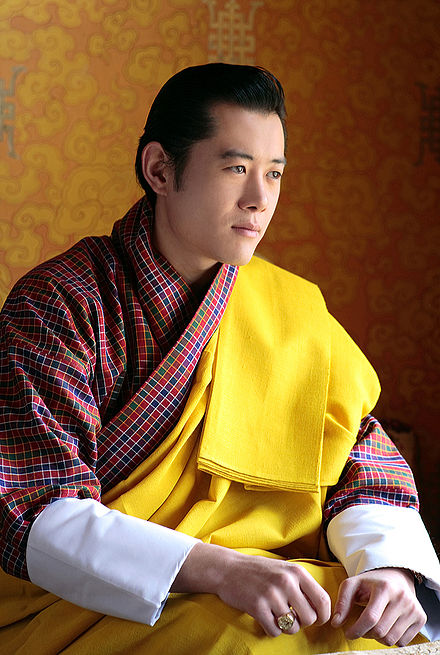
The Fifth King of Bhutan – Jigme Khesar Namgyel Wangchuck (Reign: 2006 to present)
Jigme Khesar Namgyel Wangchuck, the 5th king of Bhutan, was born in 1980 and was coronated in a ceremony on November 1, 2008. This was significant as 2008 marks the 100th anniversary of the monarchy in Bhutan.
King Jigme Khesar received a foreign education; he studied in the United States before graduating from Magdalen College, University of Oxford.
Even though King Jigme Singye Wangchuck surprised his people when he abdicated his throne two years ahead of plan. The nation’s doubt and concerns were quickly allayed during the young King’s first speech where he assured his people he would continue to rule with his father’s policies in mind.
Achievements And Reforms
Under the fifth King’s rule, he oversaw the implementation of the Constitution of Bhutan, gifting to his people the democracy his father had wished for.
After his coronation, the King’s first landmark project was the National Cadastral Resurvey in March 2009, which focused on improving the lives of people living in remote parts of Bhutan. In 2011, he launched the Kidu Foundation to provide for people, especially children, the elderly, the disabled, and those who are sick. The role of the Kidu Foundation is to work with government efforts to address critical issues in areas of education, the rule of law, democracy and media, sustainable economic development, and preservation of the country’s environmental and cultural heritage.
In 2011, he married Jetsun Pema, and the Royal Wedding was Bhutan’s largest media event in history. During the ceremony, the King bestowed the Crown of Druk Gyaltsuen (Queen) on Jetsun Pema, thus proclaiming her formally as the Queen of the Kingdom of Bhutan. The youngest queen in the world is often praised for her beauty, intelligence, and kind heart.
That same year, the King also launched Desuung (Guardians of Peace), a voluntary program to encourage citizens to play an active role in nation-building. It's one of the most successful initiatives in Bhutan, and more than 20,000 volunteers have been trained in the program.
Legacy
Known as the "People's King," he has modernized Bhutan while preserving its culture. His leadership during the COVID-19 pandemic was particularly notable. The pictorial book "Druk Gyalpo - The King of Bhutan" commemorates his contributions, capturing a decade of his reign and Bhutan's progress into the 21st century. His international presence and initiatives have significantly raised Bhutan's profile globally.
On December 17th, 2023, during the 166th National Day address, His Majesty King Jigme Khesar Namgyel Wangchuck announced plans for Gelephu city to become an economic hub for Bhutan, marking a significant initiative and legacy of the King. The Gelephu Mindfulness City project aims to transform Gelephu into a unique economic hub centered on mindfulness, integrating well-being, sustainable development, and innovation as key pillars of the city's growth.
Public Perception Of Each King In Bhutan
Each king has left a unique mark on Bhutan’s history, from unifying the country to modernizing its governance and culture. This section highlights how the Bhutanese public has viewed and honored the legacy of each monarch, showing the deep connection between the royal family and its citizens.
-
King Ugyen Wangchuck was revered as a unifier who established a stable monarchy. He earned respect for his diplomatic skills and leadership.
-
King Jigme Wangchuck was seen as a traditionalist who maintained stability and independence during challenging times. His focus on internal security earned him admiration.
-
King Jigme Dorji Wangchuck is remembered as a reformist who modernized Bhutan, earning widespread admiration for opening the country to global relations.
-
King Jigme Singye Wangchuck is hailed for creating the Gross National Happiness philosophy, making him beloved for balancing progress with cultural preservation.
-
King Jigme Khesar Namgyel Wangchuck is widely respected for guiding Bhutan into democracy while championing youth empowerment and sustainability. His approachable, compassionate leadership has endeared him to the public.
Bhutan’s Monarchy Vs. Other Global Monarchies
Bhutan’s monarchy differs significantly from others worldwide, especially in its active governance and focus on holistic national well-being. Unlike the largely ceremonial roles seen in monarchies like the United Kingdom or Japan, Bhutanese kings have directly shaped the country’s policies.
Their leadership introduced democratic reforms, decentralization, and the Gross National Happiness (GNH) philosophy. In contrast, most modern constitutional monarchies focus on maintaining traditions and acting as symbolic heads of state, with limited involvement in legislative or policy-making processes.
Bhutan’s monarchy remains uniquely people-centered, blending tradition with progressive governance.
Conclusion About The Kings Of Bhutan
The Kings of Bhutan have played a pivotal role in shaping the nation's unique blend of tradition and modernity. From the unification efforts of the first Druk Gyalpo, Ugyen Wangchuck, to the democratic reforms under King Jigme Khesar Namgyel Wangchuck, the monarchy has been a stabilizing force guiding Bhutan through significant transformations. Each king's vision has fostered national unity, cultural preservation, and sustainable development.
For those inspired by Bhutan's rich history and unique culture, Druk Asia, a trusted tour operator, offers comprehensive travel experiences for all kinds of travelers, including cultural, luxury, and adventure packages.
Discover the magic of Bhutan with DrukAsia's expert guidance. Book your journey and explore the Land of the Thunder Dragon. Contact us today!
Frequently Asked Questions About The Kings Of Bhutan
Why Does The Fourth King Of Bhutan Have Four Wives?
The Fourth King of Bhutan, Jigme Singye Wangchuck, married four sisters, known as the Four Queen Mothers, simultaneously. This decision was made to prevent family rivalry and maintain harmony within the royal family. It is also alleged that a prophecy foretold he would marry four sisters, descendants of Shabdrung Ngawang Namgyal, the lama who unified Bhutan in the 17th century. To fulfill the prophecy, he proceeded with the marriage.
Who Are The 4 Ashi of Bhutan?
The Four Ashi (Queens) of Bhutan known as Queen Mothers of Bhutan are Ashi Dorji Wangmo Wangchuck, Ashi Tshering Pem Wangchuck, Ashi Tshering Yangdon Wangchuck, and Ashi Sangay Choden Wangchuck, all married to the fourth king, Jigme Singye Wangchuck. The Queen Mothers have played significant roles in supporting the King and contributing to various social, cultural, and philanthropic initiatives in Bhutan.
Who Is The Future King Of Bhutan?
The future King of Bhutan is the crown prince Jigme Namgyel Wangchuck, the first son of King Jigme Khesar Namgyel Wangchuck and Queen Jetsun Pema, born in 2016.
What Was The Significance Of The 2011 Royal Wedding In Bhutan?
It was the largest media event in Bhutan, formally crowning Jetsun Pema as queen. The royal wedding symbolized the continuation of the monarchy in a modern era, with the King, often referred to as the "People's King". The major national event has brought the people of Bhutan together in celebration. It was a time of unity and joy, reflecting the deep respect and affection the Bhutanese have for their King and Queen.
What Is The “High Value, Low Volume” Tourism Policy In Bhutan?
A policy initiated during King Jigme Singye Wangchuck's reign to control the impact of tourism while ensuring that Bhutan's natural landscapes, cultural sites, and traditional way of life are preserved. As part of the policy, all tourists entering Bhutan are required to pay a daily Sustainable Development Fee (SDF). By targeting high-value tourists, Bhutan ensures that those who visit are genuinely interested in experiencing and respecting the country's culture and traditions, thus helping to preserve its unique cultural identity.
